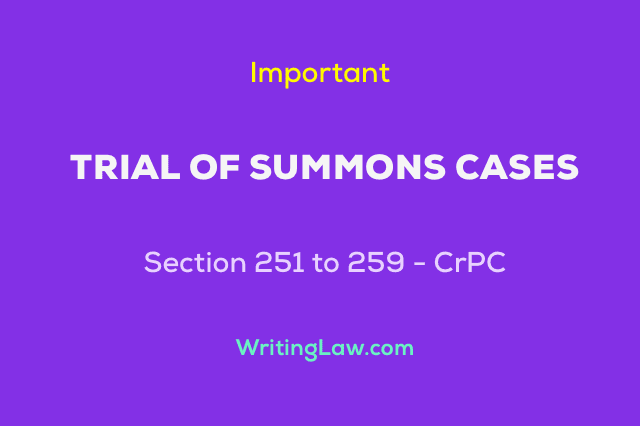
The trial of summons case has been dealt with under Chapter 20 of the Criminal Procedure Code from section 251 to 259.
According to section 2(w) of CrPC, summons cases are those cases that are not warrant cases. Summons cases are punishable with a fine or imprisonment of less than two years. Summons cases are triable only by Magistrate.
Under summons cases, it is not necessary to frame the charge in writing, stating the substance of the offence to the accused is enough. The particulars of the offence of which the person is accused are stated to him.
Procedure For Summons Cases
- Section 251: Substance of accusation to be stated
- Section 252: Conviction on plea of guilty
- Section 253: Conviction on plea of guilty in the absence of accused in petty cases
- Section 254: Procedure when not convicted
- Section 255: Acquittal or conviction
- Section 256: Non-appearance or death of the complainant
- Section 257: Withdrawal of complaint
- Section 258: Power to stop proceedings in certain cases
- Section 259: Power of court to convert summon cases into warrant cases
- Section 250: Compensation for accusation without reasonable ground
Section 251: Substance of accusation to be stated
When in summons cases, the accused appears or is brought before the Magistrate, the substance or particulars of the offence shall be stated to him and will be asked if he pleads guilty or claims to be tried. It isn’t necessary to frame a formal charge.
Section 252: Conviction on plea of guilty
If the accused pleads guilty, his plea shall be taken on record, and the Magistrate upon his discretion may convict him thereon.
Section 253: Conviction on plea of guilty in the absence of accused in petty cases
This section provides with the procedure where (summons issued under section 206 of Criminal Procedure Code), the accused pleads guilty to the charge in his absence on a plea of guilt. The Magistrate has been given the discretion to convict and sentence the accused. The section allows the pleader appearing on behalf of the accused person to plead guilty on his behalf. The fine can be paid through a registered post.
Section 254: Procedure when not convicted
Suppose the accused is not convicted under section 252 or 253 of the Criminal Procedure Code. In that case, the Magistrate shall hear and take evidence of prosecution on record and also hear and take evidence of the defence. Summons shall be issued to witness when required. The reasonable expense shall be deposited in court incurred for the attendance of witnesses.
Section 255: Acquittal or conviction
After taking evidence on record, if the Magistrate finds the accused not guilty, he shall acquit the accused. If the accused is found guilty, the Magistrate shall either proceed under section 325 or 365 of CrPC or pass the sentence thereon.
Section 256: Non-appearance or death of the complainant
This section is applicable only in summons cases instituted on a complaint. Where the complainant is absent on the date of hearing or date so fixed, the Magistrate may acquit the accused. Or, for some reason, he may adjourn the case to the next date. The Magistrate may dispense with the attendance of the complainant if he is represented through pleader or where his personal attendance is not required.
Section 257: Withdrawal of complaint
A complaint can be withdrawn with the prior permission of the Magistrate, anytime before the final order is passed. It will have the effect of acquittal of the accused.
Section 258: Power to stop proceedings in certain cases
This section shall apply in summon case instituted otherwise than upon complaint, the Judicial Magistrate Class I or any other magistrate with the prior permission of Chief Judicial Magistrate may stop the proceedings at any stage without pronouncing judgement with justified reason.
Effect of stopping proceeding:
- If the proceedings are stopped after taking evidence of the main witness, it will have the effect of acquittal of the accused.
- If the proceedings are stopped before taking evidence of the main witness, it will have the effect of discharge of accused.
Section 259: Power of court to convert summon cases into warrant cases
A summons case may be converted to a warrant case when it is punishable with imprisonment exceeding six months and it is in the interest of justice. The case will be reheard as in warrant trial, and the witness may be recalled for examination.
Section 250: Compensation for accusation without reasonable ground
An order of compensation can be passed in favour of the person discharged or acquitted by the Magistrate who acquitted or discharged the person. Such order is passed on the ground that there was no sufficient ground for accusation. Before passing such an order, a show-cause notice will be issued. The amount of compensation cannot be more than the fine that such Magistrate can impose. In default of payment, the person may undergo simple imprisonment for a period not exceeding 30 days. The order of compensation is not absolute or final; it is an appealable order.
Read Next:
1. Differences Between Summon and Warrant
2. What Is the Procedure of Search by a Police Officer (Search With Warrant and Search Without Warrant)
- What Is a Foreign Judgement and When It’s Not Binding in India - 26th July 2022
- What Are Second Appeals Under Civil Law - 23rd June 2022
- Civil Appeal as Per the Civil Procedure Code - 12th June 2022







